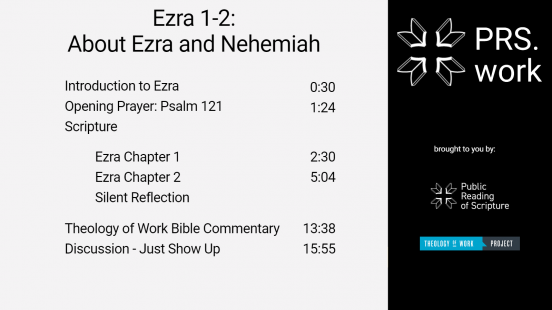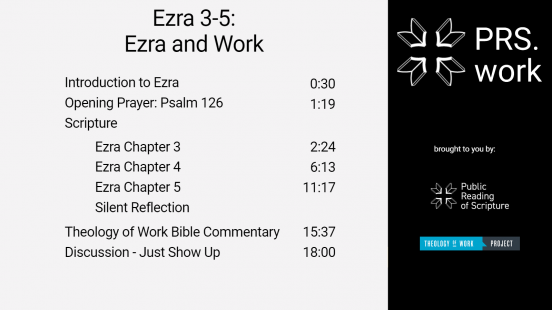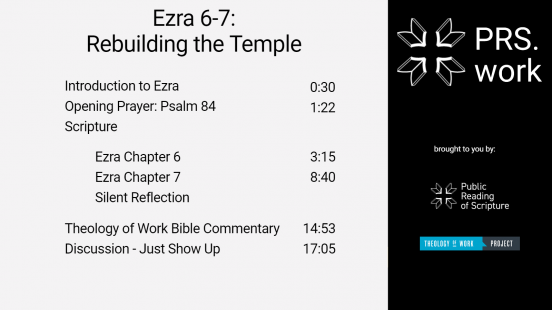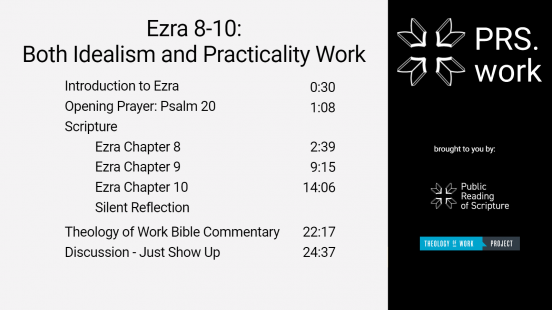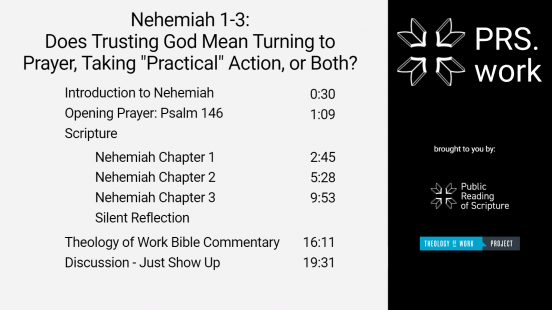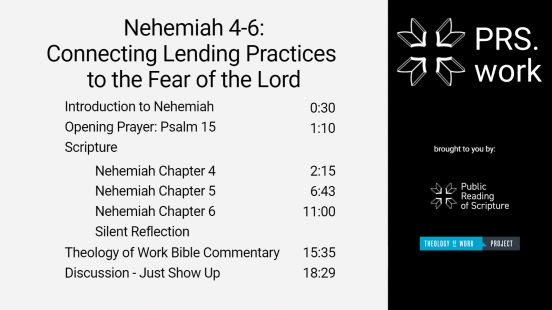Ezra and Nehemiah Series
Connect the books of Ezra and Nehemiah to your work today.
Ezra Chapters 1-2: Working in Places Hostile to God’s Values (16 minutes)
The books of Ezra and Nehemiah depict what it is like for God’s people to work in unwelcoming workplaces, openly hostile to God’s values and plans. Yet along the way they receive surprising help from nonbelievers in the highest positions of civic power. God’s power seems to crop up for his people’s good in surprising places.
Ezra Chapters 3-5: Ezra and Work (18 minutes)
The books of Ezra and Nehemiah use historical events to illustrate the theme of restoration, showing how God once restored his people and how people played a central role in this work of renewal. This encourages us to look at how our work may contribute to implanting God’s kingdom in today’s world.
Ezra Chapters 6-7: God at Work Beyond What Meets the Eye (17 minutes)
The Book of Ezra begins with a decree from King Cyrus of Persia, allowing the Jews to return to Jerusalem to rebuild the temple that had been destroyed by the Babylonians in 587 BC. This decree introduces us to one of the principal themes of Ezra and Nehemiah: the relationship between God’s work and human work.
Ezra Chapters 8-10: Idealism and Practicality Both Work (25 minutes)
Ezra was willing to stake his life on the idea of God’s protection, rather than to ensure protection with human help. Nehemiah sought practical help from human authority, and God granted him success as well. Ezra and Nehemiah show us that human efforts are successful when God is at work in them.
Nehemiah Chapters 1-3: Does Trusting God Mean Turning to Prayer, Taking “Practical” Action, or Both? (20 minutes)
Christians sometimes seem to act as if there were a rigid wall between actively pursuing our own agenda and passively waiting for God to act. This is a false duality. Nehemiah and company’s arduous work warns us that trusting God does not equate with sitting on our hands waiting for magical solutions for our difficulties.
Nehemiah Chapters 4-6: Connecting Lending Practices to the Fear of the Lord (19 minutes)
As it was to Nehemiah, God’s call to today’s workers is to do everything we can for our people. In practice, that means we each owe God the duty of caring for all the people who depend on our work: employers, co-workers, customers, and the public. Nehemiah may not tell us exactly how to handle today’s workplace situations, but he tells us how to orient our minds as we decide. Put people first.
Nehemiah Chapters 7-8: Nehemiah Gives Credit to God (20 minutes)
Nehemiah exercised considerable skill to organize the builders, inspire them to work, and fend off attacks and distractions. Nevertheless he saw all of this as work done with God’s help.
Nehemiah Chapters 12-13: Restoration of Covenant Life (21 minutes)
Sabbath-keeping was central to God’s first covenant people, and their vows were threatened by economic interaction with those who did not honor the Sabbath. In today’s context, we may want to examine whether our current round-the-clock culture of commerce puts us in a similar situation.

